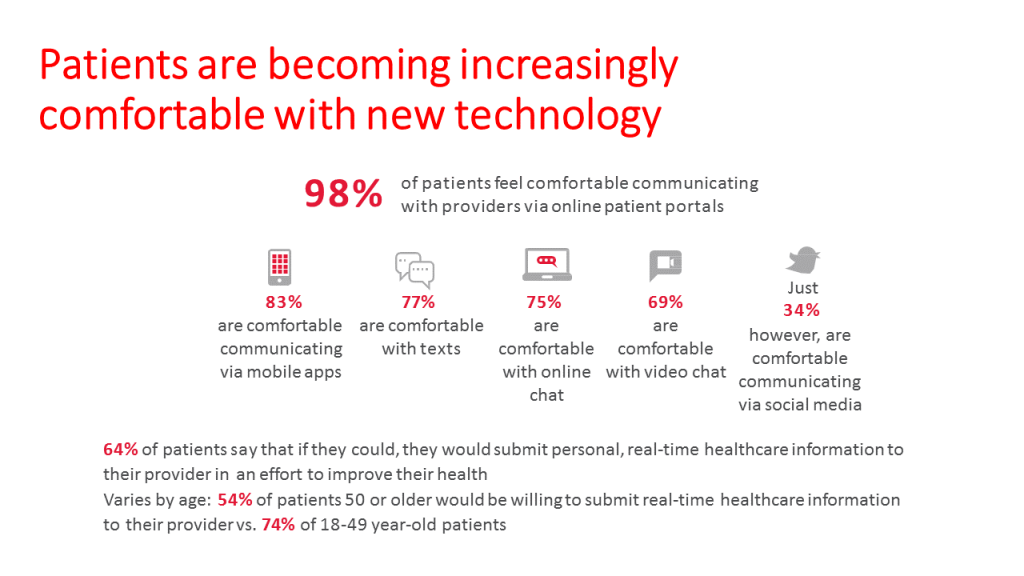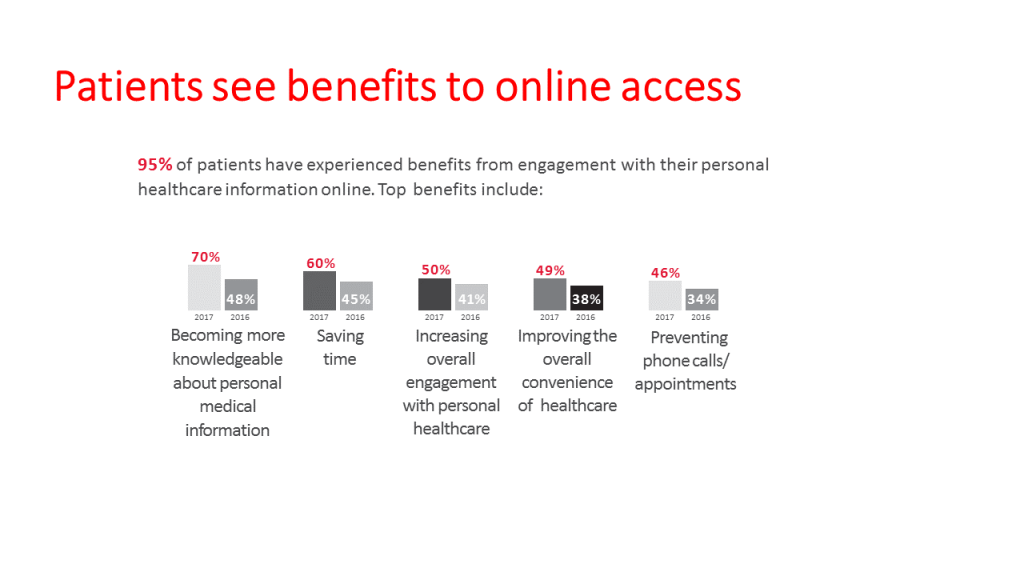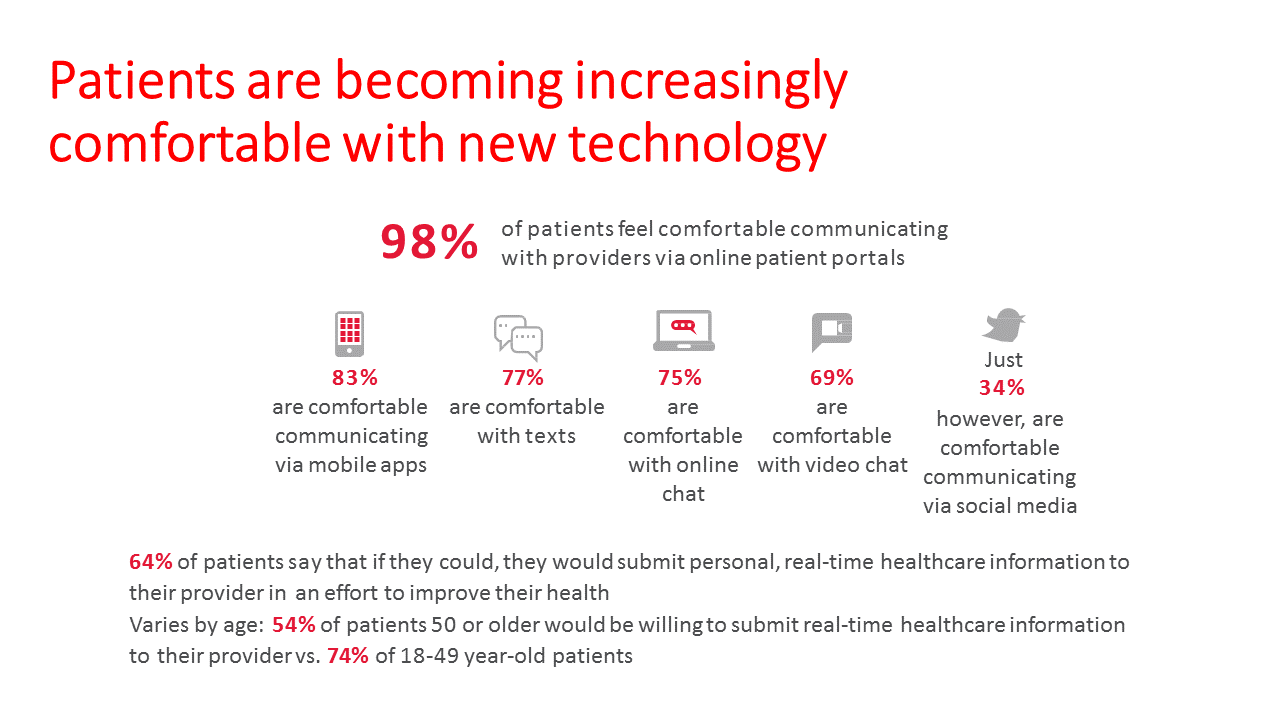
It’s generally thought that healthy people are more health-engaged than people diagnosed with medical issues. But that’s old health school thinking: most health consumers managing chronic conditions say they’ve become more engaged with healthcare over the past two years, according to CDW’s 2017 Patient Engagement Perspectives Study.
In 2017, 70% of patients told CDW they’d become more engaged with healthcare, up from 57% in 2016. That’s a 20% growth in the proportion of patients engaging in healthare in just one year.
Growing signs of patient engagement are in people driven to access online patient portals for their personal healthcare records:
- People using an online patient portal provided by healthcare providers, growing from 45% in 2016 to 74% of patients using portalas in 2017
- More frequently speaking to healthcare providers, by 69% of patients
- More frequently accessing personal healthcare information, by 69% of patients.
 Underneath these trends is consumers’ growing recognition of the benefits of online access. Nearly 100% of patients have experienced benefits from engaging with personal health information online, with:
Underneath these trends is consumers’ growing recognition of the benefits of online access. Nearly 100% of patients have experienced benefits from engaging with personal health information online, with:
- 70% of patients becoming more knowledgeable about personal medical information in 2017;
- 60% of patients saving time
- 50% of patients increasing overall engagement with personal healthcare
- 49% seeing improvement in overall healthcare convenience
- 46% of people saving unnecessary phone calls and appointments.
It’s also commonly thought that older patients won’t want or be able to access their online health information. However, by 2017, 53% of older patients over 50 years of age said they used a portal at least monthly.
Finally, patients are getting comfortable communicating with providers via digital channels: 83% of patients are comfortable communicating via mobile apps, 77% are comfortable with texts, 75% are comfortable with online chat, and 69% of patients are comfortable with video chat.
For this research, CDW interviewed 200 patients diagnosed with a chronic disease. This population was defined as people who had been to the doctor six or more times in the past year (including visits to any primary physician or specialist, but excluding dental care).
Health Populi’s Hot Points: CDW’s research confirms that not only healthy, younger people engage with digital tech for health: people who are managing medical conditions have also gone digital, especially when it comes to accessing their personal health information via online portals to electronic health records.
CDW also polled healthcare providers on their progress to meeting patients’ digital demands. Sadly, only 29% of patients would give their healthcare providers an “A” for their use of tech to engage with them. The bottom line: 9 in 10 patients would like to be able to more easily access their personal healthcare records.
This begs the perennial question: who owns our (patients’) data? As patients continue to grow their health consumer muscles, and experience, they’ll be expecting greater and more streamlined accessibility to “their” health information. Those providers who do not respond to this demand may see more digitally-savvy patients move to practices who offer more digital access, apps, and convenient, personalized health coaching services.





 I love sharing perspectives on what's shaping the future of health care, and appreciate the opportunity to be collaborating once again with Duke Corporate Education and a global client on 6th May. We'll be addressing some key pillars to consider in scenario planning such as growing consumerism in health care, technology (from AI to telehealth), climate change, and trust -- the key enabler for health engagement or dis-engagement and mis-information. I'm grateful to be affiliated with the corporate education provider
I love sharing perspectives on what's shaping the future of health care, and appreciate the opportunity to be collaborating once again with Duke Corporate Education and a global client on 6th May. We'll be addressing some key pillars to consider in scenario planning such as growing consumerism in health care, technology (from AI to telehealth), climate change, and trust -- the key enabler for health engagement or dis-engagement and mis-information. I'm grateful to be affiliated with the corporate education provider  Thank you FeedSpot for
Thank you FeedSpot for